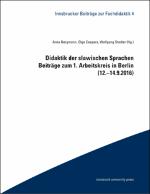Didaktik der slawischen Sprachen
Beiträge zum 2. Arbeitskreis in Innsbruck (19.–20.2.2018)
Contributor(s)
Drackert, Anastasia (editor)
Karl, Katrin Bente (editor)
Collection
AG UniversitätsverlageLanguage
German; RussianAbstract
This edited volume documents the second meeting of the working group "Didactics of the Slavic Languages" that took place in Innsbruck (February 19-20, 2018). It consists of twelve chapters written by German and Austrian researchers in the area of teaching Slavic languages as well as graduate students. Overall, the articles cover research conducted at universities and secondary schools. The edited volume documents a wide range of different approaches, research questions and methods. Two different Slavic languages (Russian and Polish) are represented. The three research areas - empirical didactics, theoretical didactics and practice-oriented didactics reflect different approaches, which complement each other and are indispensable for a solid scientific examination of didactic questions: Desiderata must be named in theoretical explanations and the transferability of theoretical models to didactic issues must be validated empirically in the field research before they are put into practice. The volume stands for the wide range of didactic research in the German-speaking community, which, in addition to traditional topics such as error correction, learner heterogeneity or teaching grammar, also includes innovative research topics such as the use of media in the classroom, interculturality or language testing. - Der vorliegende Tagungsband dokumentiert das Treffen des 2. Arbeitskreises „Didaktik der Slawischen Sprachen“ in Innsbruck (19.–20.02.2018). In ihm publizieren 12 deutsche und österreichische FachdidaktikerInnen und erstmalig auch M.Ed.-AbsolventInnen Beiträge zu drei inhaltlichen Themengebieten: „Empirische Fachdidaktik“, „Theoretische Fachdidaktik“ und „Praxisorientierte Fachdidaktik“. Insgesamt umfassen die Artikel sowohl den hochschuldidaktischen Bereich inklusive der LehrerInnenausbildung als auch den Lernort Schule. Der vorliegende Band dokumentiert eine breite Fülle an unterschiedlichen Ansätzen, Fragestellungen und Methoden. Dabei sind zwei unterschiedliche slawische Sprachen (neben überwiegend Russisch auch Polnisch) vertreten. Die Dreiteilung der Beiträge spiegelt die unterschiedlichen Ansätze wider, die sich gegenseitig befruchten und jeweils unerlässlich für eine solide wissenschaftliche Auseinandersetzung mit didaktischen Fragestellungen sind: In theoretischen Ausführungen müssen Desiderata benannt und theoretische Modelle in ihrer Übertragbarkeit auf didaktische Belange hin überprüft werden, in der Empirie müssen eben diese Erkenntnisse aufgegriffen und in der Feldtestung überprüft werden, damit sie schließlich in der Praxis umgesetzt und ihrerseits validiert werden können. Der Tagungsband steht für die Breite fachdidaktischer Forschung im deutschsprachigen Raum, der neben klassischen Themen der Fachdidaktik (wie z. B. Fehlerkorrektur, Umgang mit Heterogenität oder Vermittlung von Grammatik) ebenso aktuelle Forschungsfragen (wie den Einsatz von Medien im Unterricht, Fragen nach der (Inter-)Kulturalität oder zum Testen) aufgreift.
Keywords
Language Teaching Methods; Slavic Studies; Sprachdidaktik; SlawistikDOI
10.15203/3187-80-1Publisher
innsbruck university pressPublisher website
https://www.uibk.ac.at/iupPublication date and place
Innsbruck, 2019Series
Innsbrucker Beiträge zur Fachdidaktik, 7Classification
Language teaching and learning
Educational: Modern (non-native or second) languages


 Download
Download